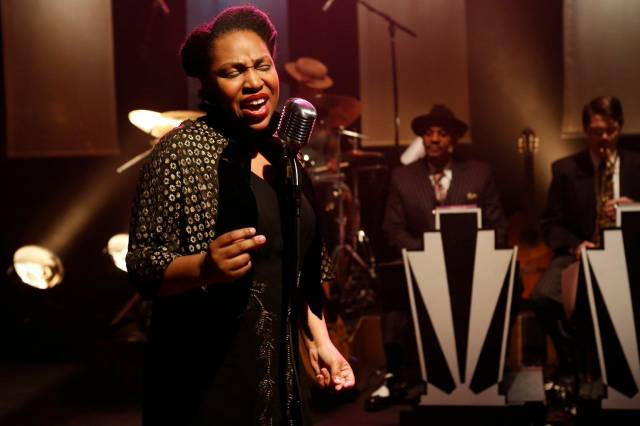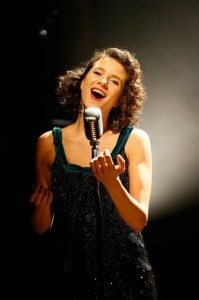

For ten glorious years, from 1938 to 1948, Greenwich Village nightclub Café Society was the place to be for jazz musicians, comics and lovers alike. Billie Holiday, Lena Horne, Sarah Vaughan, Count Basie, Zero Mostel, Sid Caesar and many others got their start at Café Society. The first racially integrated club in New York City, both onstage and off, Café Society was a bastion of leftist ideals, perpetuated by its charismatic Jewish Russian proprietor, Barney Josephson. Unfortunately, this idealism also led to its demise, as the Red Scare caught up with Josephson and the House Un-American Activities Committee threw his Communist brother Leon in jail. Shortly after, the authorities shut the place down for allegedly adulterating their liquor.
Now, audiences can practically relive the halcyon days of Café Society with Café Society Swing, a wonderful show at 59E59 that plays like a night out at a jazz club, with an 8-piece band and three principal singers (Cyrille Aimée, Allan Harris, and Charenee Wade) alternating as the musicians who famously graced the club’s stage. Based on Josephson’s memoir, Café Society: The wrong place for the Right people, Café Society Swing smartly utilizes a narrator (Evan Pappas), who weaves the story of the nightclub and its many famous and infamous moments in between the now-classic musical numbers. Playing different characters, Pappas spends Act One as a 1948 journalist attempting to break an exposé of Café Society’s Communist ties, while Act Two see him as a barkeep at the club, and eventually Josephson himself.

While the story of Josephson, his club and his discovery of so many great musicians is fascinating alone, it’s the music that really drives the show. The house band would not be out of place in such prestigious clubs as the Village Vanguard or Blue Note. Musical director-playwright-pianist Alex Webb and director Simon Green have skillfully transformed the 59E59 theater into a jazz club with impressive musicians and vocalists. Harris deftly doubles as guitarist and vocalist. Wade doesn’t so much impersonate Lady Day as she does channel the exuberant chanteuse. Aimée’s vocals are unique and enchanting, and her captivating rendition of the sensual “Closing Time” with Pappas is so playful and charming, it is one of the most delightful moments of the play. Another remarkable number is Wade performing “Strange Fruit,” the famous song about lynching in the South that launched Billie Holiday’s career into the stratosphere.
While Café Society Swing may be the perfect play for jazz aficionados, non-jazz fans would be remiss to skip this show. It is a lesson in one of the most fascinating periods in American history and a concert all in one. If that won’t get you swinging, nothing will.
Through January 4 at 59E59.